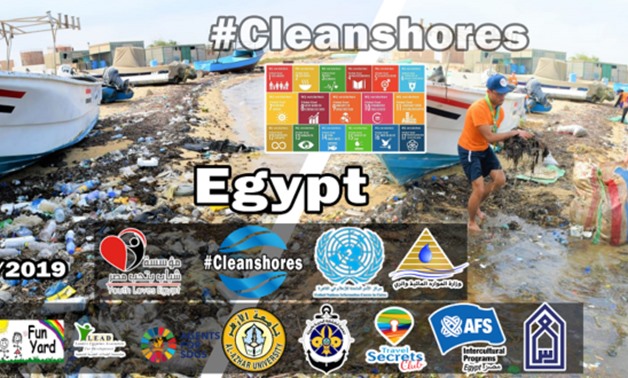
The Youth Loves Egypt (YLE) launches second phase of #BeatPlasticPollution initiative
CAIRO – 14 April 2019: The Youth Loves Egypt (YLE) has launched the second phase of the initiative to limit the use of plastic bags in the Egyptian coastal areas #BeatPlasticPollution within the framework of achieving sustainable development and Egypt’s environmental 2030 vision.
The initiative is taking place starting April 13, 2019 until April 12, 2021, and will be divided into several stages that will be later announced.
The second edition of this initiative, which aims to protect the environment in Egypt and North Africa, aims at limiting the danger of plastic wastes, which require hundreds of years to decompose. It will cover entire coastal areas from Aswan to the Mediterranean, the Red Sea, the Gulf of Suez, South Sinai, and Alexandria.
Moreover, the initiative also includes organizing awareness campaigns and workshops in schools, universities and local communities. This is in collaboration with around 21 north African foundations.
Media representatives were welcomed by the foundation to attend the activities of the initiative that will take place on Saturday 13 April from 9.30 am to 12 noon at the Sea Scout Club in Giza next to the Abbas Bridge. There will also be activities at the same time in the sea scouts in Ismailia, specifically Lake Tamsah and Assiut Corniche in collaboration with Al Azhar University and Safaga.
In 2018, the Egyptian Ministry of Environment announced taking part in the 2018 World Environment Day under the theme “Beat Plastic Pollution”, which focuses on how plastic, one of the most dangerous pollutants, affects our ecosystems and environment.
Former Minister of Environment Khaled Fahmy said the ministry launched in 2017 a new national initiative to reduce the consumption of plastic bags, and use biodegradable bags as well as long term bags.
Fahmy said during the celebrations of the World Environment Day that bags made of recycled fabric are a better alternative for plastic, adding that plastic bags will no longer be available for free.
In the same context, Mohamed Shehab, CEO of the Egyptian Environmental Affairs Agency (EEAA), said that the national EU-funded initiative to reduce the consumption of plastic bags has been launched on June 5, 2017, during which around 4.5 million tons of biodegradable plastic bags were distributed in 18 months.
He further explained that Egypt is committed to the 2030 strategic development plan for sustainable development to stop using plastic bags, remarking that several Arab and African countries have already done so.
He said that Egypt consumes 12 billion tons of single-use plastic bags annually, at a cost of LE 2 billion, adding that the agency tends to reduce the use of plastic bags through encouraging producers to manufacture disposable and paper bags.
In line with the global move to reduce the consumption of plastic bags, Fahmy extended the activities of his ministry’s new national initiative called “Enough Plastic Bags”.
Fahmy participated on May 4 in an initiative by distributing 4,500 non-woven bags as alternatives to traditional non-recycled plastic bags.
About 4,500 eco-friendly biodegradable plastic bags, which decompose through living organisms, have been circulated since the launch of the initiative.
Many animals die after swallowing these plastic bags. Plastic bags are also often burned, releasing toxic fumes into the atmosphere.
As part of the initiative, the Ministry of Environment has launched a public advertisement campaign to raise awareness on the hazard of plastic bags.
Many other African counties have launched initiatives to put an end to the plastic bag hazard. In 2008, Rwanda became one of the first African countries to impose a complete ban on thin plastic bags as part of its Vision 2020 plan for sustainability. Currently, all plastic bags used in Rwanda are biodegradable.
It is worth mentioning that the Hurghada Environmental Protection and Conservation Association (HEPCA) said that Red Sea Governor Ahmed Abdullah announced banning the use of single-use plastic starting June 1st, due to its serious environmental damages.
HEPCA, an NGO specialized in conserving marine and land in Egypt's Red Sea, said that the use of disposable plastic causes the death of hundreds of thousands of living creatures in the world.
The decision comes to "protect the threatened and endangered species which are severely affected by ingestion, starvation, suffocation, drowning, entanglement and toxicity from plastic remains which affects the human health accordingly," HEPCA explained
The governorate will prevent factories from producing or distributing plastic bags in the city, according to HEPCA.
The decision to ban the use of the disposable plastic will apply to food outlets, coffee shops, supermarkets, butchers, groceries, pharmacies and other facilities, according to HEPCA, excluding the use of heavy duty garbage bags from the ban.

Comments
Leave a Comment